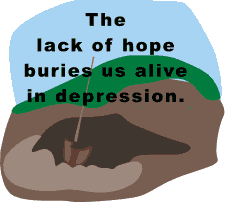
Discouragement & Depression: Its Causes and Solutions
Reflections upon Haggai
Paul J. Bucknell
Depression | Two Cycles| Cycle #1 Guilt | #1 Obedience | Cycle #2 | Wisdom | Compassion | Promises
Cycle #1 describes our spiritually dry and barren lives. Circumstances have gown absolutely oppressive. However, in all of this 'low time,' God is trying to speak. To the degree that we and others obey, He brings His Spirit upon His people to accomplish His work.
Let's look at Cycle #2 now from Haggai 2:1-23 where we gain special insight into how to care for the depressed.
Cycle #2 Caring for the Depressed (Haggai 2:1-23)
 Where guilt reigned in the lives of the people in the first cycle, despair and depression have settled in here in this second cycle.
Where guilt reigned in the lives of the people in the first cycle, despair and depression have settled in here in this second cycle.
Only one month after they started rebuilding, the prophet Haggai is again sent to them. They fell off from their job. What God had so inspirationally begun has now disappeared like a sudden storm. This incident very easily can cause a number of fears to rise up in the minds of the unstable.
Might Fail Again
Many people make the unwise decision not to obey because they might fail again. Most of us are aware of this kind of fear. It is one of Satan's favorite tools because it disables an otherwise potent candidate for service to God. What stand between them and a life of obedience? Fear. They fear they might fall again.
This kind of fear strips us from hope. This lack of hope is what buries us alive in depression. We get locked into a situation in which we feel there is no release. Our bondage is not real, but it appears real. Each possible escape has been sealed with an excuse. Each excuse is cleverly disguised in a lie provided by the evil one. Others might come by and try to shake us from our doubts and fears by showing the foolishness of the excuses that we hold to, but in our pride and fear, we can't hear them. Nothing seems to be able to shake the dark doubts that have penetrated the soul of the depressed.
God understands depression. He knows the stages of depression.
Stages of Depression
Discouragement > Disbelief > Despair > Depressed
It is not easy if not impossible to map when these depressions begin and end. We only know for sure that depression is when a person has locked himself into disbelief so that he cannot escape. Before he is sealed into depression, he comes in and out of despair. It is at this time that excuses are so regularly exercised that they become internalized as part of the thinking process and can no longer be objectively studied. We have believed the lie as true and therefore think highly of our excuses even others around us continue to question us..
Although we might be able to clearly explain the process, we greatly feel for those who have fallen for these lies. They feel lonely, abandoned, rejected and often hated. We can understand why depressed people would contemplate suicide as a solution to their problem. They are convinced there is an infinite mess between them and normalcy and have just accepted as fact the notion that nothing can or will help them.
Deliverance from Depression
God understands this trap of the evil one. He cleverly breaks up the evil one's plan and sets the prisoner free.
We will cover these important steps in a moment, but first let us notice that there is not much that really separates the prisoner from freedom. It is true they might not be in what they call clinical depression. The only substantial difference is the degree to which they have internalized the lies about God and themselves as true.
Our hope stems from the way God can intervene in a depressed person's life and bring back the sparkle of life. Let's look at how God did this. We will note God's wisdom, compassion, and promises.
 Our Old Testament Library includes many more Bible studies along with books, powerpoint slides and hundreds of articles making the scriptures come alive.
Our Old Testament Library includes many more Bible studies along with books, powerpoint slides and hundreds of articles making the scriptures come alive.
info@foundationsforfreedom.net
Scriptures typically quoted from the New American Standard Bible unless noted:
(C) Copyright The Lockman Foundation 1988










